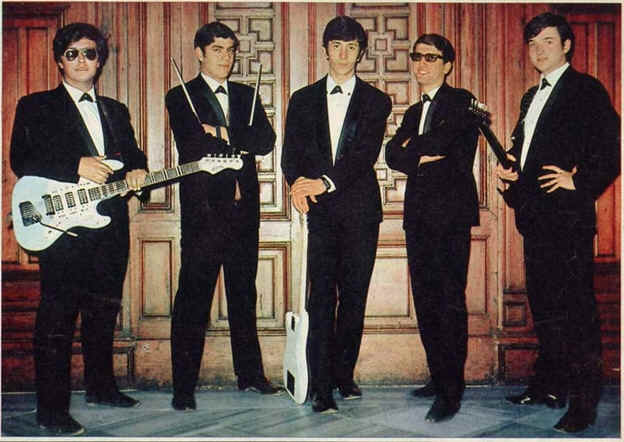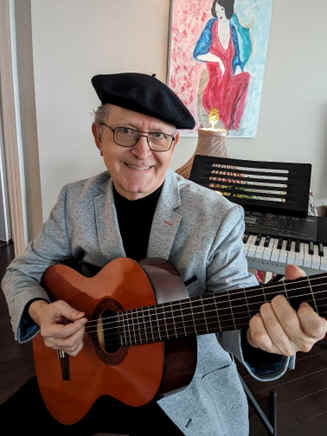
My
Silent Guitar
By
Cemil Otar
In
my teens, I wanted to become a great guitarist. It didn’t work out that way.
Instead, I ended up making a great living.
I
started reading at age five. At seven, the pile of books that I read was taller
than me. In grade four, I read Gustave Flaubert’s Madame Bovary, and my
world exploded beyond the likes of Jules Verne, Conan Doyle, and Cervantes. In
grade seven, I was on stage as Dr. Faust in Goethe’s play, in German,
the high-school version. It was one of the happiest times of my life.
When
I was in grade eight, my classmate played an instrumental piece on a record
player, Apache by The Shadows. I was mesmerized. This was it; no more
reading, no more acting. I was going to play guitar. I took lessons. I stopped
biting my fingernails. I borrowed my friend’s guitar whenever I could. I
chased turtles at our summer place to peel off the best picks. I
imagined myself becoming a great guitarist. And this dream helped me overcome
the pain of calluses developing on my fingertips.
I
noticed that in a band, the solo guitarist worked the hardest. The rhythm
guitarist worked almost as hard. However, the bass was different. He just stood
in one place, playing the same chords on only four strings over and over and
over, with no excitement, often with his tongue out like a blepping cat, and
occasionally grimacing at an invisible object on the ceiling. Yes, this was a
perfect posture for my introverted personality.
So,
I decided to learn the bass. Using my savings from my summer job, I bought a
wreck of a guitar in the Istanbul flea market near my boarding school. My mom
sewed a cover for it. I was hoping that after a couple of years of practice,
I’d be invited to join the school band.
There
was one problem. My inclination towards arts was not congruent with my dad’s
vision of what I should be doing with my life. He kept quiet about it, but I
expected to hear his logical voice in due time.
That
day came sooner than I thought. Dad wanted me to come by his office. We
scheduled my visit on that Wednesday afternoon during my school’s free time.
After
a short walk from my school, I arrived at his office. Through the glass pane on
his door, I noticed that a guy was sitting across from his desk, his back to me.
I could see my dad’s concerned look while listening to him. He noticed me
standing outside, smiled, and waved me in. His visitor turned around. I
recognized him immediately; I thought, Holy shit! This can’t be true!
My
father introduced me, my face dazed. We shook hands, Holy shit, again. I
shook the hand of the most popular actor in the country. He starred in so many
of my favorite action movies. Dad pointed me to the couch at the back of the
room. I stumbled there and quietly sat down in disbelief.
My
dad was one of the leaders of the Crimean Tatar diaspora in Turkey. This famous
actor was one of our people. As I listened to their conversation, I overheard
that he was broke. He was there asking for money. Their conversation ended with
my father saying, “You need to watch how you spend your money. I am so sorry.
We cannot support you anymore. We need the money to bring over the families that
Stalin sent to exile.”
He
left in a huff. Without missing a beat, my dad grabbed his jacket, “Let’s go
eat something.”
We
went to our favorite restaurant around the corner. We had a steaming Tatar dish
called köbete
followed by an oven-baked custard. Both were delicious.
On
the way back, Dad said, “We do need art, yes. We do need creative people, yes.
Sadly, they make so little money, even after they become famous.”
I
thought he was talking about the actor. I realized that it was meant for me,
“Cemil, maybe it is better for you to concentrate more on math and sciences.
You’ll have a happier life.”
We
arrived at his office building and hugged goodbye. Walking back to school, I
thought about Dad’s words. He was right. Even this famous actor was destitute.
My future could not be the guitar. A few weeks later, I started enjoying math,
physics, and chemistry. I became one of the top five in our class in science
subjects. Now, my only involvement in music was listening to it and cheering for
our school band in concerts. The fire was out.
A
few years after this incident, I crossed the ocean and found myself at the
University of Toronto, enrolled in mechanical engineering. I loved it.
In
my late fifties, I bought an inexpensive guitar, a Yamaha C-40, hoping to show
my granddaughter a few chords here and there. Instead, her parents hired a
professional guitar teacher. Now sixteen, she sings and plays her guitar well.
The dream that sprouted and died within me a lifetime ago, prospered in the
heart of someone I love. What an amazing gift for me.
Three
years ago, at age sixty-nine, I rediscovered my guitar in my basement locker,
under a huge mountain of toilet papers that we had stocked for the pandemic. I
was hoping to feel my way back to creativity during the lockdown. I gently
carried my guitar upstairs like a mother carries her newborn baby. I spent hours
wiping and polishing it.
The
truth is, it didn’t need any wiping and polishing. I was just taking my time
to build up the courage to hold it again in my arms. Finally, I was able to
place my guitar against my heart. I positioned my left hand on the fingerboard.
My right hand was ready to rake: Am, C, D, F… There is -- a house -- in New
Orleans --. My calluses did well, but that damn trigger finger (stenosing
tenosynovitis) did
not. It kept locking.
Hell,
maybe I never had talent anyway. Dad, you were right, thank you. Math and
engineering worked well for me. I am safe. See you again one day, in due time.

Our
school band, 1968.
https://www.youtube.com/watch?v=npbuesZqBoU
The
audio in this clip was recorded during a high school music competition in 1968.
Our school’s entry song was In the Deep End (by The Artwoods, 1967).
Some words got lost in translation during the practice and it turned into In
the Deepings. Nevertheless, our school won the second place. The video shows
all the fun we had in the age of innocence, the late 1960’s.

Me
and my dear friend Yamaha:
Cemil
arrived in Canada when he was twenty and made a wonderful life for himself. He
was an engineer during the first part of his working life and a financial
planner until his retirement in 2018. He spends his winters in Thornhill, his
summers in Niagara-on-the-Lake.